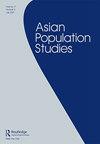The impact of college education on women’s fertility: evidence from a natural experiment in South Korea
IF 1.5
4区 社会学
Q2 DEMOGRAPHY
引用次数: 3
Abstract
ABSTRACT This study estimates the impact of women’s college education on their fertility-related outcomes by taking advantage of a natural experiment known as the graduation quota program that massively expanded women’s opportunities to attend college in South Korea. After the 1979 military coup, the military regime in South Korea ordered all public and private colleges to expand their college admission levels by 30 per cent in 1981 and 50 per cent in 1982. This study implemented instrumental variable (IV) analysis using the Korean Longitudinal Survey of Women and Families (KLoWF). Specifically, our IV analysis uses the birth cohorts that were differently exposed to this sudden and exogenous policy change as an instrumental variable to identify the longer-term effects of college education on women’s fertility-related outcomes. It is found that college education caused those women who were induced to attend college by the graduation quota program to have fewer children. Furthermore, this study finds that this impact can be partially explained by women being less likely to get married.大学教育对女性生育能力的影响:来自韩国自然实验的证据
摘要:本研究通过利用一项被称为毕业配额计划的自然实验,估计了女性大学教育对其生育相关结果的影响,该计划大规模地扩大了韩国女性上大学的机会。1979年军事政变后,韩国军事政权下令所有公立和私立大学在1981年和1982年分别将大学招生规模扩大30%和50%。本研究采用韩国妇女与家庭纵向调查(KLoWF)进行工具变量(IV)分析。具体来说,我们的IV分析使用不同的出生队列暴露于这种突然的外源性政策变化作为工具变量,以确定大学教育对女性生育相关结果的长期影响。研究发现,大学教育导致那些被毕业配额计划诱导上大学的女性生的孩子更少。此外,这项研究发现,这种影响可以部分解释为女性不太可能结婚。
本文章由计算机程序翻译,如有差异,请以英文原文为准。
求助全文
约1分钟内获得全文
求助全文
来源期刊

Asian Population Studies
DEMOGRAPHY-
CiteScore
3.30
自引率
14.30%
发文量
12
期刊介绍:
The first international population journal to focus exclusively on population issues in Asia, Asian Population Studies publishes original research on matters related to population in this large, complex and rapidly changing region, and welcomes substantive empirical analyses, theoretical works, applied research, and contributions to methodology.
 求助内容:
求助内容: 应助结果提醒方式:
应助结果提醒方式:


